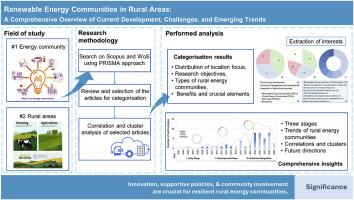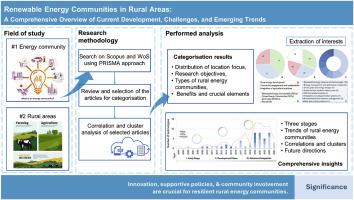农村地区的可再生能源社区:当前发展、挑战和新趋势综述
IF 10
1区 环境科学与生态学
Q1 ENGINEERING, ENVIRONMENTAL
引用次数: 0
摘要
在气候变化中实现环境和经济稳定需要可再生能源技术。这篇综述分析了 86 篇关于农村能源社区的文章,强调了促进其发展和可持续性的关键技术、经济和社会因素。研究结果表明,农村能源发展(38%)、社区参与(36%)和农业一体化(26%)是关键的重点领域,技术创新、监管框架和社区参与等驱动因素为其提供了支持。新趋势表明,在三个阶段(2004-2024 年)中,将从本地化解决方案转向综合混合系统和智能电网。跨国比较表明,各地区的优先事项各不相同,中国、泰国和意大利强调环境效益,而美国、波兰和印度则强调经济收益。主要挑战包括资金限制(21%)、基础设施(35%)、监管(44%)和参与(52%)。发展的核心要素是复原力、可扩展性和创新,复原力、经济效益和社会参与之间具有很强的相关性(R2>0.80)。本综述强调了创新、政策支持和社区参与的必要性,以培育具有复原力和可扩展性的农村能源社区,促进可持续性和能源安全。本文章由计算机程序翻译,如有差异,请以英文原文为准。


Renewable energy communities in rural areas: A comprehensive overview of current development, challenges, and emerging trends
Achieving environmental and economic stability amid climate change requires renewable energy technologies. This review analyses 86 articles on rural energy communities, highlighting key technological, economic, and social drivers of their growth and sustainability. Findings show that rural energy development (38%), community engagement (36%), and agricultural integration (26%) are key focus areas, supported by drivers like technological innovation, regulatory frameworks, and community participation. Emerging trends reveal a shift from localised solutions to integrated hybrid systems and smart grids across three stages (2004–2024). Cross-country comparisons indicate varied regional priorities, with environmental benefits emphasised in China, Thailand, and Italy, and economic gains in the U.S., Poland, and India. Main challenges include financial constraints (21%), infrastructure (35%), regulation (44%), and participation (52%). Core elements for development are resilience, scalability, and innovation, with strong correlations (R2 > 0.80) between resilience, economic benefits, and social engagement. This review underscores the need for innovation, policy support, and community involvement to foster resilient, scalable rural energy communities, promoting sustainability and energy security.
求助全文
通过发布文献求助,成功后即可免费获取论文全文。
去求助
来源期刊

Journal of Cleaner Production
环境科学-工程:环境
CiteScore
20.40
自引率
9.00%
发文量
4720
审稿时长
111 days
期刊介绍:
The Journal of Cleaner Production is an international, transdisciplinary journal that addresses and discusses theoretical and practical Cleaner Production, Environmental, and Sustainability issues. It aims to help societies become more sustainable by focusing on the concept of 'Cleaner Production', which aims at preventing waste production and increasing efficiencies in energy, water, resources, and human capital use. The journal serves as a platform for corporations, governments, education institutions, regions, and societies to engage in discussions and research related to Cleaner Production, environmental, and sustainability practices.
 求助内容:
求助内容: 应助结果提醒方式:
应助结果提醒方式:


